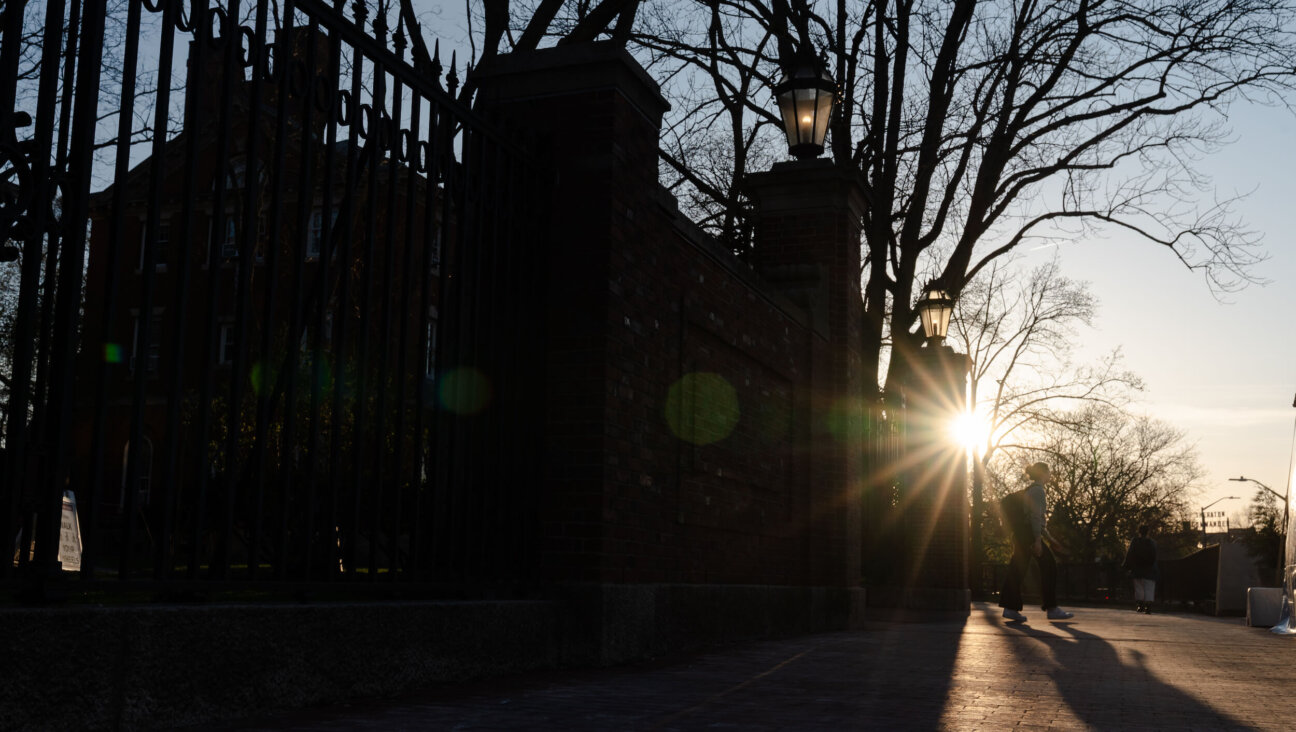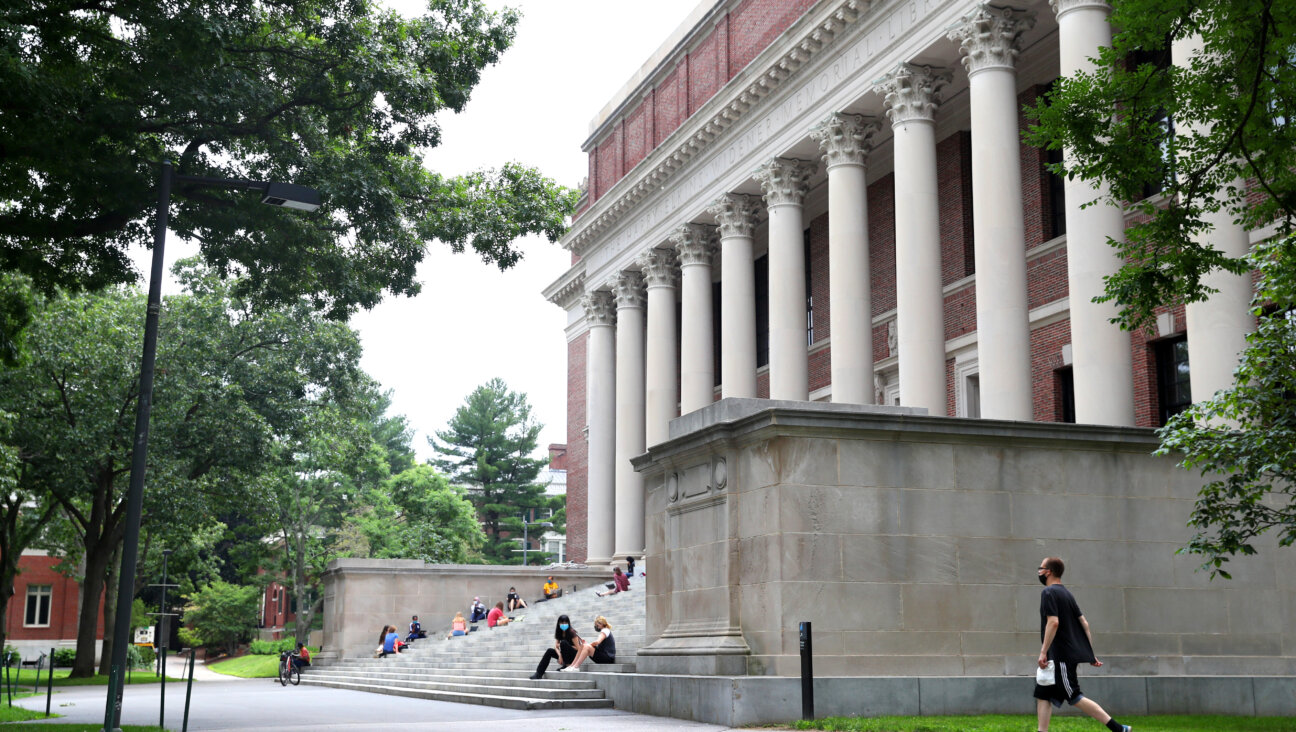Liberals Defend Gay Marriage As Religious Right
With the Senate slated to vote in three weeks on a constitutional amendment banning same-sex marriage, an interfaith coalition of liberal clergy is arguing that the measure would violate their religious liberty.
The coalition, billed as Clergy for Fairness, opposes the Marriage Protection Amendment, which would constitutionally define marriage as a union between a man and a woman. Nearly two-dozen organizations — including the Alliance of Baptists and the Episcopal Church USA, the National Council of Jewish Women and the Reform movement’s Central Conference of American Rabbis, and several Sikh groups — belong to the coalition, which sent 35 religious leaders to Washington on Monday to meet with members of Congress.
One month ago, 50 conservative Jewish and Christian leaders signed a letter backing the marriage amendment.
In recent years, gay rights advocates have primarily argued that a ban on same-sex marriage unlawfully impedes the civil rights of homosexuals — an argument that has held sway in a handful of state courts, including those in Massachusetts and Vermont. The liberal clergy members have reiterated that argument, but are also objecting to the amendment as a perilous blow to religious liberty.
“The backers behind this amendment seem to assume that every spiritual tradition considers one man and one woman to be the only form of marriage,” said coalition member Craig Axler, religious leader of Reform Congregation Beth Or in Maple Glen, Pa. “To consciously legislate against religious traditions, which is really how I see this amendment… is really an affront to my faith.”
The Senate Judiciary Committee approved the Marriage Protection Amendment, authored by Colorado Republican Wayne Allard, in a 10-8 party-line vote May 18. Advocates said they expect the measure to be brought to the Senate floor the week of June 5, and to come up for a vote in the House of Representatives sometime later in the summer or early fall.
The debate over the amendment — which, like an identical measure proposed in 2004, is unlikely to be approved by Congress — comes as President Bush’s approval rating has reached an all-time low and as GOP congressional leaders are worried about losing control of the Senate and the House of Representatives in November.
Democrats need to pick up 15 seats to win control of the House and six seats to take back the Senate. Last week, the nonpartisan Cook Political Report, which tracks congressional races, increased its estimate of vulnerable Republican seats to 36 from 24.
For some Republican candidates facing close races, the renewed debate over gay marriage is seen as an opportunity to shore up support with the party’s conservative religious base, which has been increasingly critical of the White House on several fronts. In recent weeks, some prominent religious conservatives have warned Republicans that they would pay a price at the polls if the GOP does not do more to fight same-sex marriage.
Senator Mike DeWine, an Ohio Republican and a co-sponsor of the marriage amendment, is himself viewed as one of the most vulnerable incumbents. While he won a second term six years ago with 61% of the vote, a recent poll by the Rasmussen Report placed him slightly behind seven-term U.S. Rep. Sherrod Brown, a Democrat from suburban Cleveland who opposes the marriage amendment and is one of the more liberal members of the state’s congressional delegation.
In 2004, both DeWine and Brown opposed a state ballot initiative in Ohio to ban gay marriage, which ended up passing with 62% of the vote even though only 51% of the voters there backed Bush, according toJohn Green, director of the Bliss Institute of Applied Politics at the University of Akron.
According to Paul Allen Beck, dean of the College of Social & Behavioral Sciences at The Ohio State University, the turnout for midterm elections is significantly lower than for presidential elections. This year, Beck said, Republicans “are worried that the shrinkage will occur more on their side than on the Democratic side,” due to disappointment over the Iraq War, high gas prices, the Ohio economy and a corruption scandal involving Ohio’s Republican governor, Bob Taft.
DeWine “wants to make sure he protects his Republican base,” Beck added.
At least seven states — Idaho, South Carolina, South Dakota, Tennessee, Virginia and Wisconsin — are slated to have measures prohibiting or restricting gay marriage on the November 7 ballot. Currently, activists opposed to same-sex marriage are gathering signatures to put the issue on the ballot in Colorado and Arizona.
According to Josh Freker, communications director of the gay rights advocacy group Fair Wisconsin, a ballot initiative opposing same-sex marriage could very well motivate both conservative and liberal activists in that state, where Democratic Governor Jim Doyle is fending off a challenge from Rep. Mark Green, a Republican. Freker said that Fair Wisconsin has the backing of a number of faith groups and is currently mounting the largest grass-roots effort in the state.
In an effort to defeat the proposed constitutional amendment, Clergy for Fairness said the group already has collected 1,600 signatures from religious leaders who oppose the constitutional marriage amendment.
According to the group’s petition, the amendment “raises alarming constitutional concerns,” both because it “would restrict the civil rights of an entire group of Americans” and because it “would infringe on religious liberty.”
“It is surely not the federal government’s role to prefer one religious definition of marriage over another, much less to codify such a preference in the Constitution,” the petition reads. “To the contrary: The great contribution of our Constitution is to ensure religious liberty for all.”
Marc Stern, general counsel of the American Jewish Congress, seconded the coalition’s objections, but said that its concerns over religious liberty do not have legal standing.
If approved, Stern said, the Marriage Protection Amendment would operate independently of the First Amendment, which guarantees the free exercise of religion and prohibits the establishment of a government-sponsored faith.
As it stands now, in cases concerning the constitutionality of laws that may be motivated by the religious beliefs of some Americans, the federal courts have ruled the measures permissible as long as their language is religiously neutral. This precedent, Stern said, would make it hard to argue that the refusal of the government to sanction same-sex marriage amounts to a violation of the Constitution.
“There are lots of actions which government takes, which are fueled at least in part by religious sentiment,” Stern said, noting that religious liberals played a decisive role in the passage of civil rights legislation and child protection laws.
The Forward is free to read, but it isn’t free to produce

I hope you appreciated this article. Before you go, I’d like to ask you to please support the Forward.
Now more than ever, American Jews need independent news they can trust, with reporting driven by truth, not ideology. We serve you, not any ideological agenda.
At a time when other newsrooms are closing or cutting back, the Forward has removed its paywall and invested additional resources to report on the ground from Israel and around the U.S. on the impact of the war, rising antisemitism and polarized discourse.
This is a great time to support independent Jewish journalism you rely on. Make a Passover gift today!
— Rachel Fishman Feddersen, Publisher and CEO
Most Popular
- 1

News Student protesters being deported are not ‘martyrs and heroes,’ says former antisemitism envoy
- 2

News Who is Alan Garber, the Jewish Harvard president who stood up to Trump over antisemitism?
- 3

Fast Forward Suspected arsonist intended to beat Gov. Josh Shapiro with a sledgehammer, investigators say
- 4

Politics Meet America’s potential first Jewish second family: Josh Shapiro, Lori, and their 4 kids
In Case You Missed It
-

Opinion Why can Harvard stand up to Trump? Because it didn’t give in to pro-Palestinian student protests
-

Culture How an Israeli dance company shaped a Catholic school boy’s life
-

Fast Forward Brooklyn event with Itamar Ben-Gvir cancelled days before Israeli far-right minister’s US trip
-

Culture How Abraham Lincoln in a kippah wound up making a $250,000 deal on ‘Shark Tank’
-
Shop the Forward Store
100% of profits support our journalism
Republish This Story
Please read before republishing
We’re happy to make this story available to republish for free, unless it originated with JTA, Haaretz or another publication (as indicated on the article) and as long as you follow our guidelines.
You must comply with the following:
- Credit the Forward
- Retain our pixel
- Preserve our canonical link in Google search
- Add a noindex tag in Google search
See our full guidelines for more information, and this guide for detail about canonical URLs.
To republish, copy the HTML by clicking on the yellow button to the right; it includes our tracking pixel, all paragraph styles and hyperlinks, the author byline and credit to the Forward. It does not include images; to avoid copyright violations, you must add them manually, following our guidelines. Please email us at [email protected], subject line “republish,” with any questions or to let us know what stories you’re picking up.











